The Entrepreneur
The Inspiring Journey of Peter Kahara Munga: Founder of Equity Bank
“Equity was built on a simple idea: to provide financial access to those who had been left out. That mission is what kept us going during the tough times. If you start a business without a purpose, you will not have the conviction to see it through,”says Dr. Paul Kihara Munga
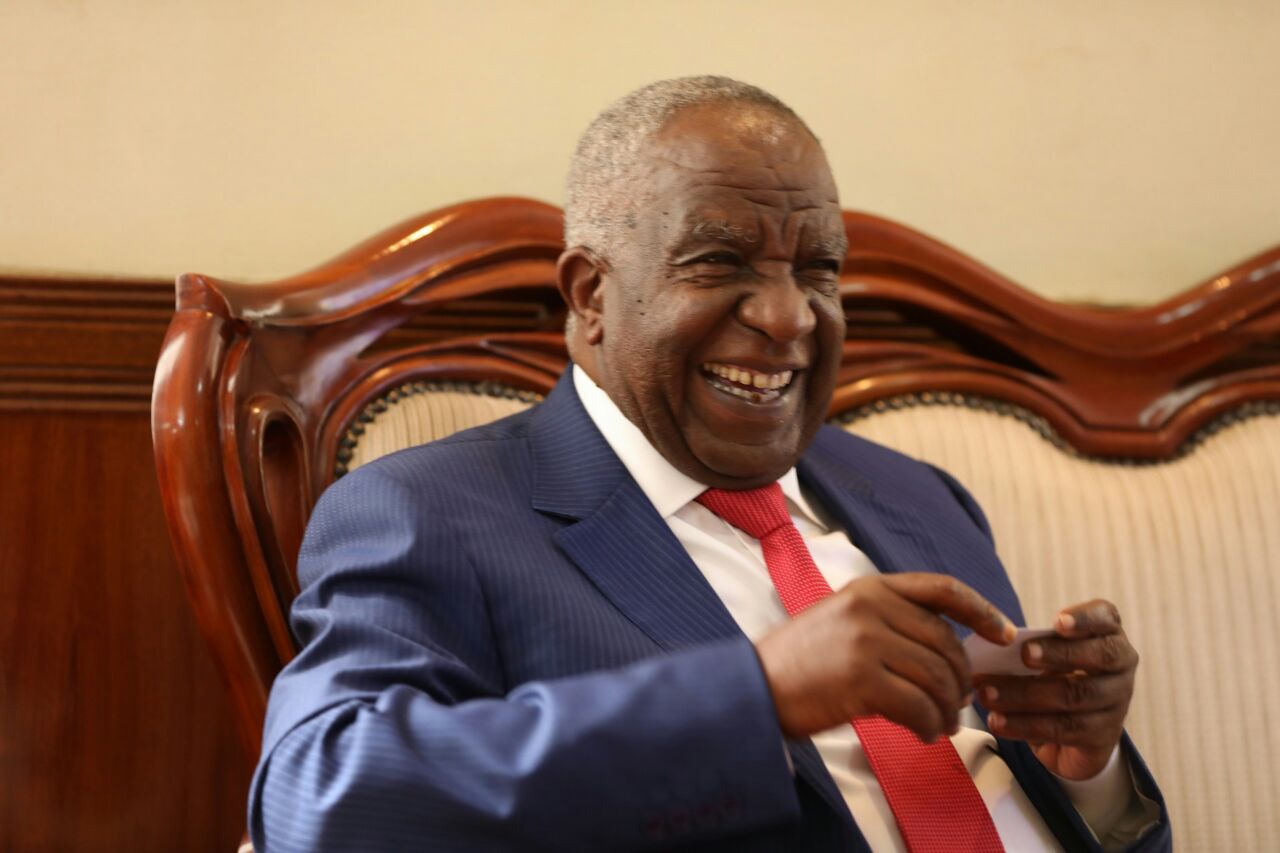
: Discover how Peter Munga founded Equity Bank with just Ksh 5,000 and transformed it into one of East Africa’s top financial institutions through resilience, innovation, and a focus on financial inclusion
By Charles Wachira
Peter Kahara Munga,aged 81, is a towering figure in Kenya’s financial landscape.He’s celebrated for his remarkable journey from humble beginnings to becoming one of the country’s wealthiest individuals.
Born in 1943 in Kangema,Central Kenya, Munga’s early life was marked by poverty. Yet, his determination and vision set him on a path to transformative success.
Munga’s educational journey was significantly supported by scholarships that allowed him to pursue his studies.
He began his education in a local primary school before completing his secondary education at Nyeri High School, a well-known institution in the region.
Munga later obtained diplomas in Human Resources and Financial Management, which laid the groundwork for his entrepreneurial endeavors.
Reflecting on the role of education, he once remarked, “Education opened doors for me that poverty would have otherwise closed. It gave me the foundation to dream bigger.”
In 1984, with just Ksh 5,000 as initial capital, Munga founded Equity Building Society (EBS) in Kangema. His mission was clear: to provide financial services to the underserved rural population, driven by a desire to combat poverty and promote economic inclusion.
“I wanted to create a financial institution that understood the needs of the ordinary Kenyan. I had seen firsthand how lack of access to credit kept many people in poverty,” Munga stated in an interview.
Despite his noble vision, Munga faced significant challenges. In the early 1990s, Equity Building Society encountered severe difficulties, including near insolvency due to a high percentage of non-performing loans.
However, Munga’s resilience and strategic leadership led to a remarkable turnaround.
Recognizing the need for fresh ideas, he recruited James Mwangi, who played a crucial role in revitalizing the institution.
By focusing on rural and low-income clients, Equity Bank distinguished itself from competitors that primarily catered to urban centers. This approach resonated with many, earning Equity the reputation of being “the people’s bank.”
The year 2004 marked a pivotal transformation in the history of Equity Building Society when it transitioned into a fully-fledged commercial bank, known as Equity Bank.
This strategic move was driven by the need for better access to capital and a broader range of financial products to meet the growing demands of its clientele. “Transforming into a bank allowed us to broaden our scope and offer more services, especially to those who had been excluded from formal banking for years,” Munga explained.
Equity Bank was later listed on the Nairobi Securities Exchange in 2006, marking a significant milestone in its growth and visibility in the financial market. Under Munga’s chairmanship, the bank expanded its footprint across East Africa, becoming one of the region’s largest and most influential financial institutions.
“Our growth was built on trust and understanding our clients. People want a bank that listens to them, a bank that is part of their community,” Munga observed.
Beyond banking, Munga founded several other enterprises, including Equatorial Nut Processors Limited and the Pioneer Group of Schools.
His commitment to education and community empowerment is evident through his philanthropic initiatives, particularly the “Wings to Fly” program, which offers scholarships to bright students from low-income backgrounds.
“Investing in education is not just about building the future of individuals; it is about building the future of a nation,” he said.
Despite his extraordinary success, Munga’s journey has not been without controversy. He has faced allegations of financial misconduct, including issues surrounding undervalued share transactions and unsecured loans linked to his connections within Housing Finance Bank.
Additionally, some of his properties have faced auction threats due to financial disputes.
But Munga remains unfazed by challenges, saying, “Every successful entrepreneur will face trials. The important thing is to learn from them and continue moving forward. Success is not about avoiding failure; it’s about how you respond to it.”
What Does It Take to Become a Successful Entrepreneur?
Peter Munga’s journey from a young boy in rural Kenya to the founder of one of East Africa’s largest banks has given him a wealth of wisdom on entrepreneurship. He believes that success is rooted in resilience, innovation, and an unwavering commitment to solving real problems.
“You must see opportunity where others see difficulty. Most people run away from problems; entrepreneurs run towards them,” he once said.
According to Munga, one of the essential traits for any entrepreneur is persistence. He often shares the story of how Equity Bank faced technical insolvency in the early 1990s.
“We were on the verge of collapse. Many would have given up. But I knew we had something valuable—a connection with the people. We just needed to find the right way to harness that potential,” he reflected.
He adds that this ability to remain focused on the goal, despite overwhelming odds, is what distinguishes successful entrepreneurs. “If you can persist when others quit, you will succeed,” he emphasizes.
Munga also underscores the importance of having a clear mission and purpose. He explains, “Equity was built on a simple idea: to provide financial access to those who had been left out. That mission is what kept us going during the tough times. If you start a business without a purpose, you will not have the conviction to see it through.”
Innovation is another key principle for Munga. As the bank began to grow, Munga recognized that it had to evolve to meet the changing needs of its clients.
“The market is always moving, and if you stay stagnant, you will be left behind. Entrepreneurs must innovate continuously, not just to stay relevant but to keep leading.”
Lastly, Munga stresses the value of integrity and building trust. “People do business with those they trust. If your customers trust you, they will stay with you through thick and thin. For us, Equity’s success was built on relationships, not just transactions.”
Legacy and Shareholding
As of now, Peter Munga holds approximately 5% stake in Equity Bank. This shareholding is significant, given his role as the founder and his long-standing influence in shaping the bank’s vision and operations since its inception. Munga’s commitment to the bank has not only established him as a prominent figure in Kenya’s financial sector but also allowed him to play a crucial part in the institution’s growth and expansion across East Africa.
Dr. Peter Kahara Munga’s story is one of resilience, innovation, and impact. His contributions to Kenya’s financial sector and philanthropic efforts continue to influence many, establishing him as a pivotal figure in transforming banking in East Africa.
Despite the controversies, his legacy as a visionary leader remains significant, embodying the spirit of perseverance and the drive to uplift others. Munga’s parting advice to budding entrepreneurs is simple: “Believe in your mission, work hard, and never give up. The road will be hard, but success always favors those who endure.”
She Business
Bethlehem Tilahun Alemu: From Ethiopian Artisan to Global Icon

: Discover how Bethlehem Tilahun Alemu built SoleRebels into a global,
sustainable footwear brand, overcoming challenges and transforming Ethiopian
craftsmanship.
Bethlehem Tilahun Alemu’s story begins in Zenabwork, a modest village on the outskirts
of Addis Ababa, Ethiopia. Growing up, she watched her community struggle with unemployment and poverty, despite a rich heritage of artisanal skills that remained largely untapped.
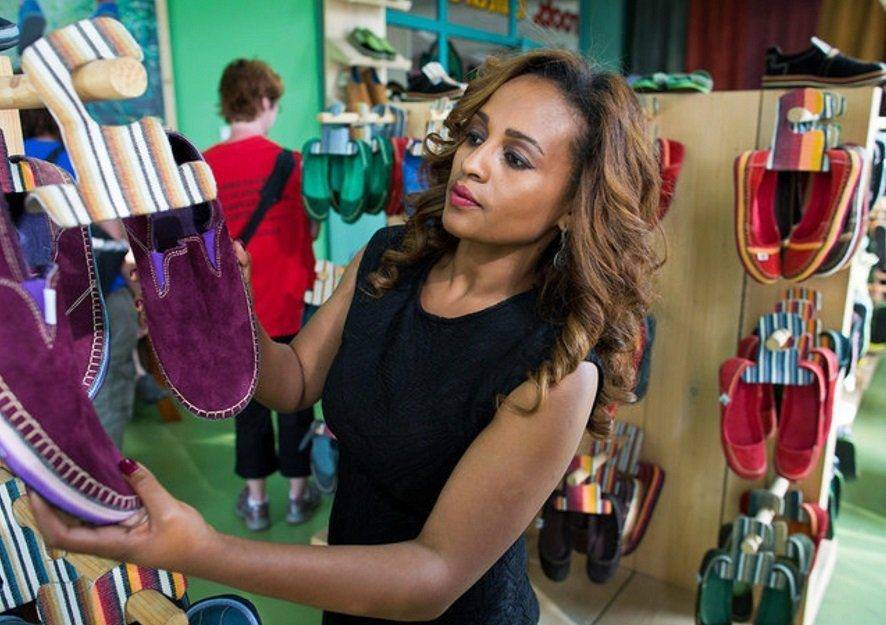
Fueled by determination and a desire to transform her surroundings, Bethlehem
embarked on a journey that would redefine African entrepreneurship and put Ethiopia
on the global map.
Her creation, SoleRebels, isn’t just a footwear brand. It’s a movement—an embodiment
of sustainability, culture, and empowerment.
A DREAM WOVEN WITH TRADITION
In 2005, Bethlehem founded SoleRebels with a simple yet powerful idea: to turn
Ethiopia’s rich artisanal craftsmanship into eco-friendly, globally competitive footwear.
Inspired by traditional “selate” shoes—made from recycled tyres—she envisioned a
brand that blended cultural authenticity with modern design.
She recruited local artisans, many of whom were unemployed, and encouraged them to
innovate while preserving traditional techniques.
Every pair of shoes was a masterpiece, crafted from hand-spun cotton, organic
materials, and repurposed car tyres. Bethlehem’s concept was groundbreaking: a product that told a story while making a global impact.
STARTING FROM SCRATCH
Like many entrepreneurs, Bethlehem’s initial challenge was capital.
With no access to bank loans or large investors, she relied on personal savings and
modest contributions from her family.
Slowly but surely, she built her business, reinvesting profits into training workers and
improving production tools. International grants and initiatives like the SEED Initiative later recognized the potential of her venture, providing additional support.

The early days weren’t easy. Artisans lacked modern tools, and accessing raw
materials was an uphill battle. But Bethlehem, known for her tenacity, tackled these challenges head-on. She developed partnerships with local suppliers to ensure a consistent supply of quality materials and invested in upskilling her workforce.
Breaking into the global market presented another hurdle. Competing against established brands seemed daunting, but Bethlehem found her edge: sustainability and ethical production.
In an era when consumers were becoming eco-conscious, SoleRebels’ ethos of fair wages, recycled materials, and cultural storytelling resonated deeply.
BUILDING A GLOBAL EMPIRE
Fast forward to today, and SoleRebels has a presence in over 30 countries, with
flagship stores in cities like San Francisco, Tokyo, and Barcelona.
It is also the first African footwear brand to be certified by the World Fair Trade
Organization (WFTO)—a testament to Bethlehem’s commitment to doing business the
right way.
Her company directly and indirectly employs over 1,200 people, making it one of
Ethiopia’s largest employers in the artisan sector.
Workers earn more than three times the industry average, a policy Bethlehem takes
immense pride in. “When we pay people well, we don’t just change lives—we transform
communities,” she says.
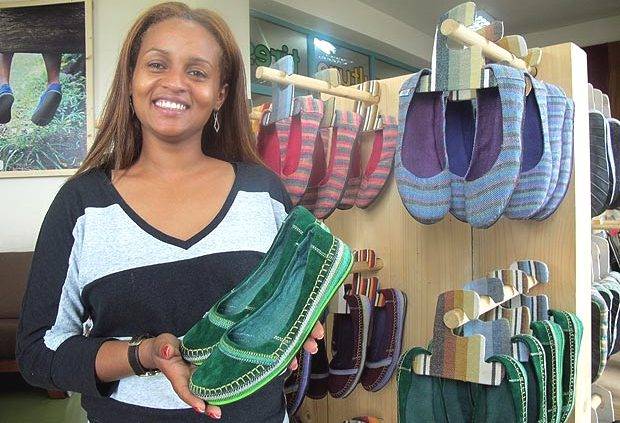
MENTORS AND INSPIRATIONS
Bethlehem often credits her late grandfather, a farmer and community leader, as her
greatest mentor.
His work ethic and deep belief in the power of local communities shaped her vision. She
also draws inspiration from global leaders, including Ethiopian Prime Minister Abiy
Ahmed, whose focus on innovation and economic growth aligns with her goals.
RISING ABOVE CHALLENGES
Bethlehem’s entrepreneurial journey has been marked by resilience. When production
scaled up, she faced supply chain disruptions that threatened deadlines. Her solution?
Cultivate long-term relationships with reliable local suppliers and diversify material
sources.
Entering new markets came with its own set of obstacles. Competing against
established brands requires a unique value proposition.

SoleRebels offered more than shoes—it offered a story: a product steeped in Ethiopian
culture, made sustainably, and crafted ethically.
VISION FOR THE FUTURE
Bethlehem isn’t slowing down. Her plans include:
- ● Expanding SoleRebels’ retail presence in Europe and Asia.
- ● Introducing sustainable clothing lines.
- ● Partnering with global brands to promote eco-friendly production in Africa.
Beyond SoleRebels, Bethlehem has a broader mission: to inspire a new narrative for
African entrepreneurship. She wants to show the world that Africa isn’t just a consumer
market but a hub for innovation and excellence.
CONCLUSION: WALKING THE TALK
Bethlehem Tilahun Alemu has redefined what it means to be an entrepreneur. From
Zenabwork’s dirt roads to the global stage, she has shown that success doesn’t come
from resources alone—it comes from vision, grit, and a deep connection to one’s roots.
With SoleRebels, Bethlehem has not only created a thriving business but a model for
how sustainable, ethical enterprises can transform communities. As she continues to
dream big, her footsteps pave the way for the next generation of African changemakers.
She Business
Joyce Akinyi Convicted: Heroin Smuggling Case Exposed
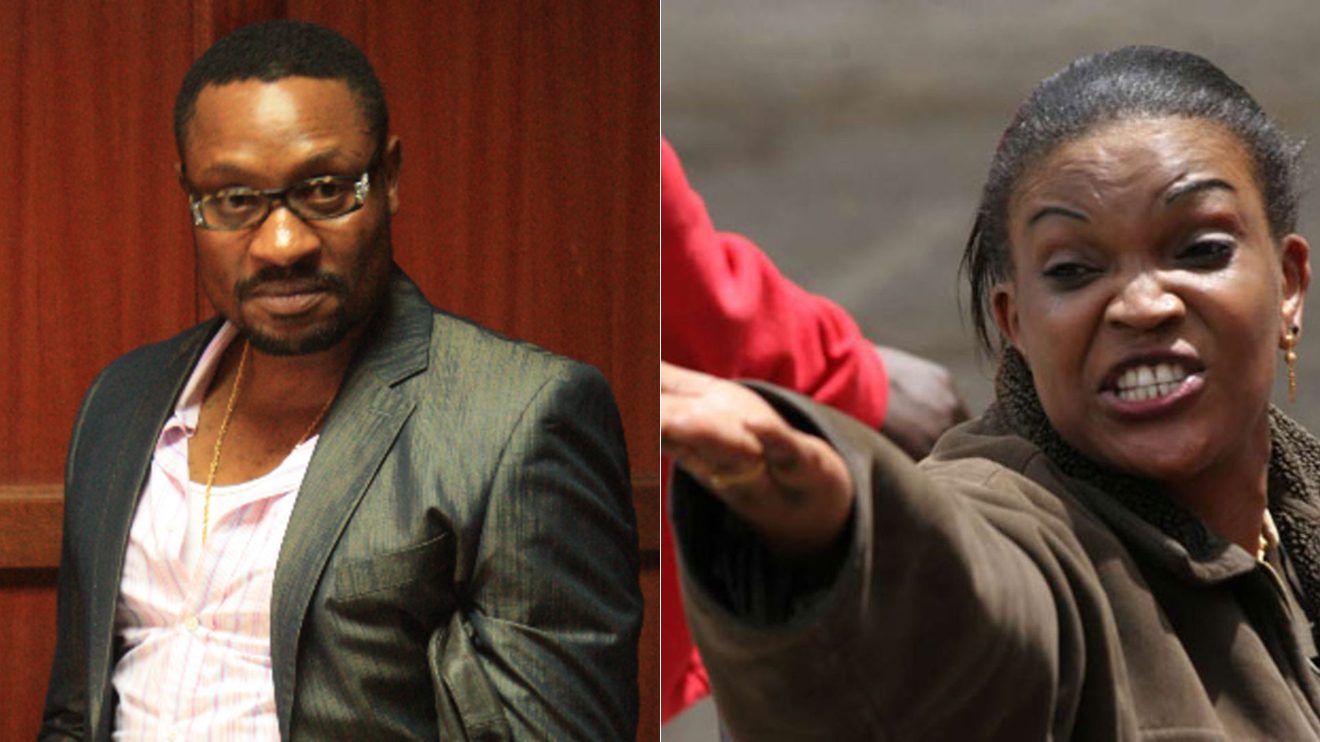
: Kenyan businesswoman Joyce Akinyi faces life imprisonment after being found
guilty of smuggling heroin worth US$ 34,483. Her history with crime has now
unravelled.
Joyce Teresia Akinyi’s story is one of dramatic highs and lows—rising from a successful
businesswoman to being convicted of a large-scale heroin smuggling operation.
With ties to international criminal networks, high-profile relationships, and repeated run-
ins with the law, Akinyi’s life has been marked by controversy and legal battles.
THE HIGH LIFE: BUSINESS AND INFLUENCE
Akinyi first gained prominence as the upscale Deep West Resort owner in Lang’ata,
Nairobi. Known for her affluent lifestyle, she mingled with Kenya’s elite and maintained
significant business interests.
However, behind the glamorous facade lay a darker world of alleged criminal activity.
Her personal life was equally turbulent. In 1998, she met Nigerian businessman Anthony Chinedu, and the couple had two children before formalising their union.
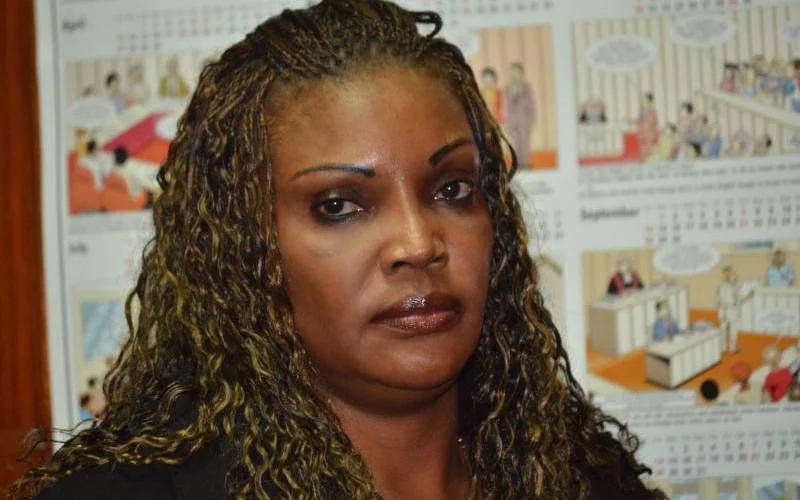
Their relationship was rocky, marked by numerous arrests on drug trafficking charges.
In 2013, Chinedu was deported from Kenya after authorities seized drugs in his
possession, a move that further exposed Akinyi to public scrutiny.
A HISTORY OF LEGAL TROUBLES
Over the years, Akinyi faced repeated allegations of drug trafficking. Her name became
prominent in 2008 when she was arrested in New Delhi, India, alongside former
Budalang’i MP Raphael Wanjala.
Authorities detained the pair with undeclared cash worth Sh7.59 million, suspected to
be linked to drug deals. Although released after intervention by the Kenyan government, the incident marked the start of a string of legal troubles for Akinyi.
In 2013, she and Wanjala were arrested again on the Nairobi-Namanga highway with a
suspicious white powder. Although they claimed it was corn flour, suspicions persisted,
and Akinyi’s criminal associations deepened.
THE TURNING POINT: CONVICTION FOR HERION SMUGGLING
Akinyi’s criminal activities reached a dramatic conclusion in 2019 when a police raid on
Deep West Resort uncovered 2kg of heroin worth Sh5 million hidden in a shoe rack.
The Anti-Narcotics Directorate linked the operation to an international smuggling
network coordinated by Akinyi.
The Jomo Kenyatta International Airport Tribunal found Akinyi guilty under Article
4(a) of the Narcotic Drugs and Psychotropic Substances Control Act, which
mandates life imprisonment for drug trafficking.
The court heard compelling evidence, including photographs of heroin wrapped in white
tape, voice recordings coordinating smuggling activities, and the discovery of a Tabita
Digital Scale used to weigh drugs.
Akinyi’s co-defendants, Paulin Kalala Musankinshay and Peres Adhiambo, were
similarly implicated. Evidence also revealed that Akinyi used multiple fake passports, including a Congolese passport in the names of “Mape Marline Kambura” and “Raha Eveline
Kambere,” enabling her to operate under different aliases.
FINANCIAL CRIMES AND ASSET RECOVERY
Beyond drug trafficking, Akinyi’s wealth came under scrutiny. In 2021, she lost two
luxury vehicles worth Sh20 million to the State, deemed proceeds of crime.
Investigations by the Asset Recovery Agency revealed that Akinyi deposited
suspiciously large sums ranging from Sh60,000 to Sh20 million into various bank
accounts. Her real estate investments—villas built and rented out—further indicated
illicit income sources.
THE END OF THE ROAD
On December 10, 2024, Akinyi faces sentencing, which could include life
imprisonment and a Sh5 million fine. Her fall from grace highlights the dangers of
unchecked ambition and illegal pursuits. Magistrate Njeri Thuku, who presided over the
case, dismissed Akinyi’s defence that the drugs were planted by her estranged husband
Chinedu, calling it baseless.
CONCLUSION
From her meteoric rise as a business mogul to her conviction as a drug trafficker, Joyce
Akinyi’s life is a cautionary tale of how power, wealth, and crime can intertwine.
Her story also underscores Kenya’s ongoing battle with drug trafficking and the far-reaching
consequences of organised crime. For Akinyi, the glitz and glamour of her former life
have now given way to the stark reality of justice.
Nb: Exchange rate 1 USD = 145 Ksh
The Entrepreneur
Miss Rwanda 2022, Divine Muheto, Faces Drink-Driving Scandal

: Miss Rwanda 2022, Divine Muheto, was arrested for drink-driving, fined, and
detained after a car crash. She expresses regret and seeks forgiveness for her
actions.
From Beauty Queen to Legal Controversy
Divine Muheto, 21, crowned Miss Rwanda 2022, rose to prominence as a symbol of
beauty and ambition. She always believed she had what it took to achieve her childhood
dream of becoming a beauty queen.
Her journey began after high school when she entered the Miss Rwanda competition,
ultimately claiming the coveted title.
Reflecting on her success, she once said, “When you fear, you can’t make anything
different in life, but when you are fearless, a lot of positive things come your way.”
Legal Troubles in 2024
However, her reign as Miss Rwanda has been overshadowed by controversy. In late
2024, Muheto was arrested following a drink-driving incident in Kigali.

Reports from the Rwanda National Police (RNP) confirmed that she was caught driving
under the influence of alcohol without a valid license, resulting in a crash that destroyed
public infrastructure, including a street light pole and palm trees.
The police also noted that Muheto fled the scene of the accident. She was subsequently
fined 190,000 Rwandan francs (approximately $140) and detained.
This incident marked a troubling pattern, as the beauty queen had previously faced
similar charges in September 2023, when she crashed her car into a building while
driving drunk.
Silent Remorse and Public Engagement
Muheto, the daughter of Assistant Commissioner of Police Francis Muheto, has
remained largely silent in the media following her arrest, though her legal team has
expressed that she deeply regrets her actions and has sought forgiveness.
Despite this, she continues to be a public figure, engaged in various activities. Her legal troubleshave raised concerns, but she remains resolute in her belief that life’s challenges present growth opportunities.

Inspirational Messages and Support System
While her parents have largely stayed out of the spotlight, Divine Muheto has continued
to inspire many young people in Rwanda, emphasising resilience and self-improvement.
She once said, “I knew I had what it takes to the last dot,” and even in the face of
adversity, she strives to move forward, learning from her mistakes and striving to make
a positive impact.
-

 Politics5 months ago
Politics5 months agoFred Okengo Matiang’i vs. President William Ruto: A 2027 Election Showdown
-

 Business & Money10 months ago
Business & Money10 months agoEquity Group Announces Kshs 15.1 Billion Dividend Amid Strong Performance
-

 Politics4 months ago
Politics4 months agoIchung’wah Faces Mt. Kenya Backlash Over Gachagua Impeachment Support
-

 Politics6 months ago
Politics6 months agoPresident Ruto’s Bold Cabinet Dismissal Sparks Hope for Change
-

 Politics7 months ago
Politics7 months agoPresident Ruto’s Lavish Spending Amid Kenya’s Economic Struggles Sparks Outrage
-

 Politics6 months ago
Politics6 months agoJohn Mbadi Takes Over Kenya’s Treasury: Challenges Ahead
-

 Business & Money2 months ago
Business & Money2 months agoMeet Kariuki Ngari: Standard Chartered Bank’s new CEO of Africa. What’s Next?
-

 Politics7 months ago
Politics7 months agoKenya Grapples with Investor Confidence Crisis Amid Tax Protest Fallout





